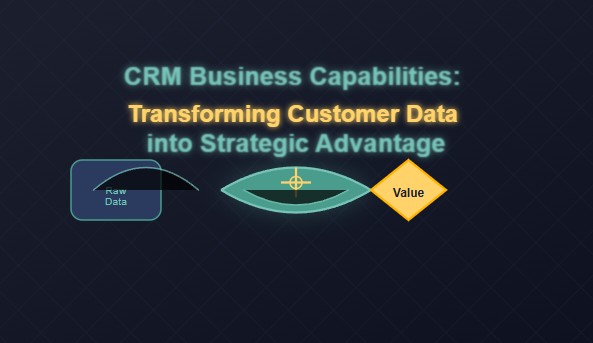In the digital era, data is currency, and customers are kings. Companies striving for growth must go beyond managing contacts—they need to orchestrate entire customer lifecycles with intelligence and agility. This is where CRM Business Capabilities take center stage, offering businesses a robust toolkit to evolve from reactive selling to proactive relationship-building.
But CRM is no longer just software—it’s a strategy, a platform, and an innovation engine. Whether you’re running a startup or a Fortune 500 enterprise, unlocking the full range of CRM business capabilities is the secret to thriving in a customer-first economy.
Table of Contents
🧠 What Are CRM Business Capabilities?
CRM Business Capabilities refer to the functional strengths and processes that a Customer Relationship Management system enables within an organization. These include:
-
Lead and opportunity management
-
Customer engagement and personalization
-
Omnichannel communication
-
Service automation
-
Sales forecasting
-
Customer insights and analytics
-
Workflow and business rule enforcement
-
Integration with back-office systems
In essence, they represent everything your CRM can do to support customer acquisition, retention, satisfaction, and growth—strategically and operationally.
🧩 Core CRM Business Capabilities
Let’s break down the main pillars of what modern CRM platforms are capable of.
1. 🛒 Sales Force Automation (SFA)
One of the oldest yet most vital capabilities.
Features:
-
Lead scoring and routing
-
Opportunity tracking and pipeline visualization
-
Activity logging (calls, emails, meetings)
-
Quote and proposal generation
-
Sales forecasting and goal tracking
Value:
-
Speeds up the sales cycle
-
Helps sales reps focus on high-value leads
-
Enhances forecasting accuracy
2. 📣 Marketing Automation
CRM systems integrate deeply with marketing tools to deliver personalized campaigns at scale.
Features:
-
Email marketing and drip campaigns
-
A/B testing
-
Customer segmentation
-
Social media tracking
-
Lead nurturing workflows
Value:
-
Boosts campaign ROI
-
Delivers the right message at the right time
-
Increases lead conversion rates
3. 🎧 Customer Service Management
Support teams use CRM to deliver timely, contextual, and consistent customer experiences.
Features:
-
Case management and ticket tracking
-
Knowledge bases and self-service portals
-
SLA management
-
Escalation workflows
-
Customer feedback collection
Value:
-
Reduces resolution time
-
Improves satisfaction and retention
-
Unifies service across channels
4. 📊 Analytics and Customer Insights
Data is only as valuable as the insights it creates. CRMs can now analyze customer behavior across the entire lifecycle.
Features:
-
Dashboards and KPI visualizations
-
Customer journey mapping
-
Churn prediction
-
Buying trend analysis
-
Lifetime value tracking
Value:
-
Enables data-driven decisions
-
Uncovers hidden patterns
-
Drives product and service innovation
5. 🧩 Integration & Extensibility
Today’s CRM is not a silo—it’s the central hub in your enterprise architecture.
Integration Points:
-
ERP (like Dynamics 365 Business Central or SAP)
-
eCommerce platforms
-
Payment gateways
-
Marketing tools
-
Customer support systems
-
Third-party APIs (weather, shipping, etc.)
Value:
-
Enables end-to-end visibility
-
Reduces redundancy and human error
-
Simplifies IT ecosystem
6. 🧱 Low-Code Customization
Modern CRMs provide drag-and-drop tools to customize forms, fields, workflows, and even apps—no devs required.
Value:
-
Empowers business users
-
Adapts fast to changing processes
-
Reduces development backlog
Tools like Microsoft Power Apps, Salesforce Lightning App Builder, and Zoho Creator allow teams to build unique business apps directly on the CRM platform.
7. 🔒 Security & Compliance Capabilities
Especially critical for industries like healthcare, finance, and government.
Features:
-
Role-based access
-
Field-level security
-
Audit logs and data versioning
-
GDPR/CCPA/HIPAA compliance features
-
MFA and SSO support
Value:
-
Protects sensitive customer data
-
Ensures regulatory readiness
-
Builds customer trust
🏭 CRM Capabilities by Industry
Let’s look at how different sectors leverage CRM capabilities.
🏥 Healthcare
-
Patient journey management
-
Referral tracking
-
Appointment scheduling
-
Telehealth integration
🏛️ Finance
-
KYC document collection
-
Investment tracking
-
Personalized financial planning
-
Risk alerts
🛒 Retail & eCommerce
-
Loyalty program management
-
Customer segmentation
-
Cross-sell & upsell automations
-
Personalized product recommendations
⚙️ Manufacturing
-
Channel partner management
-
Quoting and configuration (CPQ)
-
Warranty & service contract tracking
-
Asset lifecycle management
🔗 Omnichannel Communication as a Capability
Modern CRM systems unify communications across:
-
Email
-
Chat
-
Social Media
-
SMS
-
Voice
-
Web Portals
Every interaction is captured in a single timeline, providing a 360° customer view. This ensures continuity across departments—so customers aren’t repeating themselves every time they reach out.
📈 AI-Driven CRM Capabilities
AI is no longer futuristic—it’s embedded into leading CRMs like Dynamics 365 and Salesforce.
AI Features:
-
Predictive lead scoring
-
Sentiment analysis
-
Smart email and call insights
-
Next best actions
-
Forecast adjustment based on trends
Impact:
-
Reps focus on high-probability deals
-
Proactive service interventions
-
Smarter customer segmentation
📋 Strategic CRM Capabilities for Business Leaders
Beyond daily operations, CRMs also support:
-
Strategic Planning: Market insights help shape product strategies
-
Partner Management: Enable B2B collaboration with dealers/resellers
-
Customer Retention: Loyalty analytics drive customer lifecycle programs
-
Revenue Optimization: Align pricing models with behavioral trends
🧠 Best Practices to Maximize CRM Business Capabilities
-
Align CRM to Strategy – Don’t just implement features—use them to meet business goals.
-
Invest in User Training – A CRM is only as powerful as its users.
-
Integrate Continuously – CRM should talk to every system in your stack.
-
Automate Intelligently – Let machines handle the repeatable; people handle the relationships.
-
Measure Everything – Use dashboards to continuously evaluate and optimize.
🔮 Future of CRM Capabilities
CRM platforms are evolving rapidly with:
-
Voice-activated interfaces (AI assistants)
-
Hyper-personalization through machine learning
-
Augmented Reality for field service and retail
-
Blockchain for secure contract workflows
The line between CRM and ERP is blurring—soon, CRM might just be your entire business operating system.
🧠 Final Words: CRM is Capability-First, Not Just Customer-First
While “Customer” is the ‘C’ in CRM, the true power lies in its capabilities to transform every department into a customer champion.
From lead generation to loyalty building, from product innovation to service excellence—CRM Business Capabilities are the fuel that powers agility, scale, and competitiveness.
If you’re only using CRM as a contact manager, you’re leaving 80% of its value on the table. Time to unlock its full potential.




